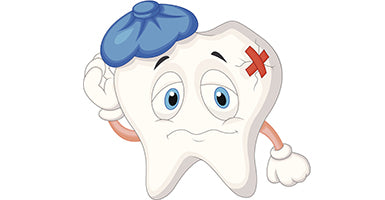Hi, this is Ann. In recognition that Breast Cancer Awareness month begins this week and that most everywhere I turn, I am reading or hearing about the “Race for the Cure” activities that are going on around the country, I wanted to give you insight into what has been happening to my own health for the last several years and how undetected teeth issues could have led to breast cancer. While I’m on a great diet, that alone couldn’t improve my breast health, but without the Hallelujah diet, I may not have the quality of life that I do today.
Over 12 years ago, I had my first and only root canal. I had researched the endodontist and found her to be one of the best in the area and she was even a professor at the area dental college. After it was completed I thought nothing more of it. In 2010, I noticed a lump on my lower right jaw and had pain and a lump on my right breast. This by the way was the same side of the mouth where I had the root canal over eight years prior.
Mammograms showed nothing but as I became aware of the connection between oral health including root canals, mercury fillings and something called “cavitations” and cancer I realized that this may well be the cause of the symptoms I was experiencing. This led me to seek out a biological dentist in Virginia who removed the root canal and the mercury amalgam he found on top of the root canal. He indicated that this combination (root canal and mercury filling) had a strong correlation with breast cancer.
30 years ago I had my wisdom teeth removed and while he was extracting the root canal tooth he found infection in the “cavitation” where the wisdom tooth had been which was located adjacent to it. It was amazing, after the removal of the root canal and cleaning of the infection I no longer had the lump in my jaw and the lump in my breast slowly receded.
That was 4 years ago. Recently, I have been experiencing a swelling in that same breast along with significant pain and discomfort. A thermal imaging scan identified a strong likelihood of malignancy. So as I was quite alarmed, I immediately got an MRI which found no indication of malignancy. There is evidence that thermal imaging can predict future cancer.
Realizing that I was also experiencing pain in the same area of my mouth where the root canal had been removed 4 years ago, I scheduled an appointment with a highly sought after biological dentist in Tennessee. It took over 3 months to get an appointment. One look at the x-rays and he felt strongly that he saw the problem.
Two weeks ago I had oral surgery where he found a cavitation in the bone in the area where the root canal was removed – it was filled with infection. The dentist estimated it was an 8 out of 10 in severity. During the surgery it oozed out quite profusely and he suggested it could easily cause the issues I was feeling in my breast. In that same day, I experienced great relief from the pain and discomfort in my breast. The swelling has gone down as well. It may be too soon to predict anything for certain, but I can say from personal experience that we must all be highly concerned about our oral health.
There is no time to wait, and there is absolutely no harm in ensuring that there is no infection or inflammation festering in formerly extracted teeth or root canals. I can testify in my own life the strong connection between the health of my mouth and the health of the rest my body. Yes, ladies we need to understand the correlation between our teeth and body, but men, you’re not exempt.
It is estimated that 97% of breast cancer cases have some connection to oral pathology. A recent study in Sweden stated that the chronic periodontal disease indicated by missing molars seemed to associate statistically with breast cancer. The study suggests the idea that the risk of a woman developing breast cancer could also be amplified by chronic gum disease. The study analyzed and evaluated over 3000 women between the ages of 30 and 40 years over a 16-year period. Among the women studied, those who reported that they had suffered from chronic gum disease or had lost teeth due to periodontal disease were found to be more than two times as likely to be diagnosed with breast cancer as compared to those who had healthy gums.
There is also evidence to connect periodontal disease to diabetes, cardiac disease and prostate cancer. According to a recent study conducted by the Harvard School of Public Health, men with a history of gum (periodontal) disease could be at increased risk of developing pancreatic cancer.
Researchers from Harvard, the University of San Juan and the Dana-Farber Cancer Institute analyzed data from more than 51,000 male subjects over a 16-year period. The purpose was to determine if gum disease or tooth loss may be related to pancreatic cancer. After adjusting for age, smoking history, diabetes, obesity, diet and other potential contributors to pancreatic cancer, the reviewers found that men with a history of gum disease had a 64 percent increased risk of pancreatic cancer than men without a history of gum disease.
Nobody knows why gum disease may be linked to pancreatic cancer. Although the study showed an association between gum disease and pancreatic cancer, a definite cause and effect relationship was not established. Researchers speculate that chronic infection in the gums triggers inflammation throughout the body, which can potentially promote the growth of cancer.
More than 120 medical conditions, some of them life-threatening, can be detected in the early stages by a dentist. It is well documented that a high percentage of health conditions can have oral symptoms, such as swollen or bleeding gums, pain/discomfort in areas of former extractions, ulcers, dry mouth, bad breath, metallic taste and various other changes in the oral cavity.
Scientific American, for example reports that current research indicates a relationship between oral and overall “systemic” health. Systemic refers to the involvement of many organs or systems of the whole body.
Years ago, a physician who detected heart disease would probably not refer the patient to a biological dentist. The same went for diabetes, or just about any other medical condition. Times have changed. The past 5 to 10 years have seen ballooning interest in possible links between mouth health and body health.
"Physicians are taking a more holistic approach to their patients’ overall health," says Sally Cram, DDS, PC, consumer advisor for the American Dental Association. And, for good reason. In one recent study, people with serious gum disease were 40% more likely to have a chronic condition.
Since 1982, the Race for Cure has been going strong. It has raised over $2 Billion dollars. I cannot say for certain where those dollars have gone, but I can unequivocally say, there has been no further advances in identifying ways to prevent and eliminate cancer. The talk is all about early detection so treatments can begin sooner.
What would the breast cancer world look like if that same $2 Billion dollars was spent researching the connection between oral health and breast health? What if that money was spent researching the nutritional deficiencies that cause breast cancer and identifying the toxins that women (and men) who develop breast cancer have been exposed to? What if that money were used to help them rid their bodies of those toxins? In 32 years of Races for the Cure, I haven’t seen or heard of one dollar being addressed toward any of those questions.
My sincere desire is to “Raise an Awareness” this month for all women (and men) to the connection between your mouth and your health. Find a qualified biological dentist in your area and determine if any of those pockets that have been lying there supposedly empty of those extracted teeth for many long years, might in fact, have hidden infections that are hindering your immune system from functioning properly. While you are at it, have your biological dentist take a look at those root canals, and your gums. That act, while it may not be glamorous could very likely save your life!
References
1. Söder B, Yakob M, Meurman JH, Andersson LC, Klinge B, Söder PÖ. Periodontal disease may associate with breast cancer. Breast Cancer Res Treat. 2011;127:497–502.
2. Singh H, Singh S. Oral and systemic health. In: Saini R, Saini S, editors. Dental Horizons: Essentials of oral health. 1st ed. Hyderabad: Paras Medical Publishers; 2011. pp. 259–73.
Continue reading

More On Vitamin D
More On Vitamin D
In one of the more recent articles I wrote titl...





